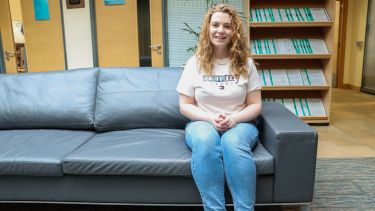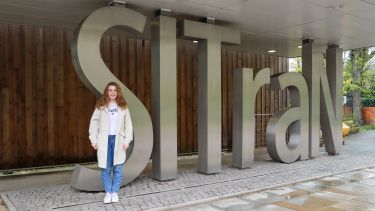If not for the MSc course I would not be where I am now

Why did you decide to study Reproductive and Developmental Medicine at Sheffield?
“I’ve always been interested in pursuing a career in fertility research. I chose Sheffield in particular due to the structure and design of the course. The course has six months worth of taught modules and six months dedicated purely to a research project which is what I wanted.
“The six month research project was a fantastic opportunity which set me up for my PhD and a future career in research. The taught modules were delivered by a range of professionals including researchers and clinicians and covered topics such as causes, diagnosis and treatment of infertility as well as embryo development and the law and ethics surrounding these topics.
“The course also has links with the assisted conception unit at Jessops which meant we could shadow embryologists and andrologists and work with them for our research projects.”
What did you enjoy most about your studies?
“I enjoyed both the taught and research modules of the masters course, however the six month research project was definitely the most enjoyable for me.
“I had previous research experience in the form of a short six week project that I completed during my undergraduate degree. The research project was a fantastic opportunity for me to build on this experience and develop my skills as a researcher. I enjoyed becoming independent in the lab and developing my problem solving skills and resilience which are absolutely necessary for a career in research."
What was the focus of your research project?
“My research looked at how live human sperm metabolise the different substrates, such as glucose, available to them in the female reproductive tract in order to have the energy required to reach and fertilise the egg.
“To do this I isolated sperm cells and incubated them alongside substrates such as glucose and then tracked their metabolism using a technique called nuclear magnetic resonance (NMR). During this project I gained practical laboratory skills such as fluorescence microscopy and NMR as well as transferable skills such as communication skills, confidence and working as a team.”
In what ways has the masters course informed your current career path?
“Upon completion of my MSc, I successfully applied for a scholarship which funds students on taught MSc courses at The University of Sheffield to go onto further PhD study. I’m now a final year PhD student, due to submit at the end of 2023.
“Throughout my PhD, I have developed numerous skills which I hope will open new doors for me. I have been able to supervise MSc students during their own six month research projects, teach students in schools about my research as part of the Brilliant Club charity, and present my research at conferences.
If not for the MSc course I would not be where I am now. My six month research project and the support of my project supervisors and the course lead were all instrumental in my successful application for the PhD scholarship.
Evie Gruszyk
The masters course also provided me with all the knowledge and skills I needed to successfully study towards my PhD in male infertility. I am excited to complete my PhD later this year and hopefully continue a career in research.
What would you say to a student thinking about studying the Reproductive Medicine course at Sheffield?
“If you are thinking about studying the Reproductive and Developmental Medicine course at Sheffield, I would suggest you look at all the similar courses offered by a range of universities and compare not just the key aspects of the courses but the support the university offers. Then you can decide what is best for you.
“For me, the University of Sheffield and this masters course offered everything I wanted and I would recommend this course and university to anyone!”

Masters study discovery afternoon
See where a Sheffield masters could take you with our on-campus event. Get expert advice, take a campus tour and chat to current students.


